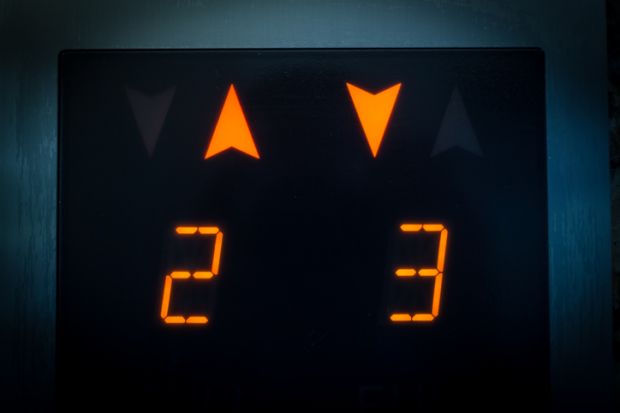Richard Ned Lebow, a professor of international political theory at King’s College London, says asking for the “ladies’ lingerie” floor in a crowded elevator at a recent conference was “lame”. But it was a joke – a reference to a bygone era when operators ran department store elevators – and he has nothing to apologise for, he says.
Simona Sharoni, a professor of women’s and gender studies at Merrimack College in Massachusetts, also thinks Lebow’s comment at the International Studies Association annual convention in April recalled a bygone era – inappropriately so. She said she and another woman on the elevator that day in San Francisco were so stunned to hear a senior scholar make a joke about women’s lingerie that they didn’t confront him at the time but later wondered if they should report him.
Sharoni did report Lebow to the ISA, and the association’s Professional Rights and Responsibilities Committee found that he had violated its Code of Conduct. But the ISA said in its letter of reprimand that it found an interim email from Lebow to Sharoni calling her complaint “frivolous” to be an even bigger violation of that code.
Lebow’s email to Sharoni said, in part, “Like you, I am strongly opposed to the exploitation, coercion or humiliation of women.” But by “making a complaint to ISA that I consider frivolous”, he added, “you may be directing time and effort away from the real offences that trouble us both.”
The ISA has given Lebow until May 15 to apologise to Sharoni – in a way that it sees fit – and plans on closing the matter thereafter. But with Lebow now going public and refusing to apologise, the elevator comment has become something of an international incident. Some see continued evidence of sexism in political science. But others are framing it as a skirmish in the culture wars and a litmus test as to whether #metoo in academe has gone too far.
Here’s how Ruth Marcus, a columnist for The Washington Post, first reported the incident, last week, for example: “Those two words – the speaker remembers saying ‘ladies’ lingerie,’ a passenger who was offended recalls hearing ‘women’s lingerie’ – have turned into the latest exemplar in the academy of political correctness gone wild.”
Marcus added, “Not every comment that offends was intended that way, and intent matters. Maybe check in with the speaker before going nuclear? Maybe consider that there is a spectrum of offensiveness? That not every stray statement by a 76-year-old man warrants a resort to disciplinary procedures?”
Sharoni, who was raised in Israel, has since received hate mail – from someone calling her a “slut” who needs to “get the fuck out of America” to someone saying she might get gifted more lingerie if she kept her mouth shut. Sharoni said late last week that she hoped to clarify she does not know Lebow and that she would have responded in the same way to anyone who made the same comment.
“Honestly, I am so exhausted of confronting sexism in the academy and paying a high price that I am reluctant to attract more media attention,” she told Inside Higher Ed. Still, Sharoni said, it’s important to note “the impact on women and other marginalised groups who witness yet another example of what happens when someone speaks up, even if one simply follows policy and is in the right, even if someone is a tenured full professor who spent a lifetime researching gender-based violence”.
She said the incident was bigger than any two people. It's about how “political correctness becomes the blanket excuse for those who refuse to rethink and change their racist, sexist and homophobic beliefs and practices” and how “men in positions of power are outraged when they are being held accountable, even if the sanction is as minor as a request for an apology”.
Sharoni praised her home institution for its support throughout this process, but said that the ISA has been “silent” about Lebow’s “victim-blaming and character assassination”, beyond its initial letter of reprimand.
Mark A. Boyer, executive director of the association, said this weekend that the case was ongoing and that he couldn’t comment on anything but process.
It’s unclear what will happen if Lebow continues to refuse to apologise, as ISA has instructed him to do. The association’s code includes a range of responses to disciplinary concerns, up to dismissal from the association. But that option hasn’t been exercised in recent memory.
Lebow told Inside Higher Ed that he was concerned the matter wasn't addressed informally, since “international relations scholars know that dialogue is the first step in addressing conflict and coercion the last. Yet, ISA went right to coercion at the outset”. (Formal complaints automatically trigger the ISA's disciplinary process. Sharoni said the association's code exists for a reason, and that while the comment would have been a “teachable moment” in her classroom, it's not her “role” to educate colleagues “who misbehave in an academic environment”.)
Lebow also quibbled with details of Sharoni’s formal account of the incident, saying she could not possibly have seen him “smirk” because of the crowd, and that a man, not Sharoni, asked him what floor he wanted (Sharoni maintains that she was next to the buttons and asking for floors). “The other men in the elevator were not ‘my buddies’, but people I had never met before,” Lebow said, “I said, ‘ladies lingerie’, not ‘women's lingerie’. The elevator was jam-packed and claustrophobic, which may be why I made my admittedly lame – but inoffensive – remark.”
As for any apology, Lebow said, “There is nothing to apologise for. If I did apologise it would be an acknowledgment that an innocent remark in an elevator is somehow wrong. It would, like the ISA's double censure of me, send a chilling message to less established professors and students that they can risk punishment for speaking their minds.”
He added, “This is my 53rd year of teaching. I have always supported women, mentored and coauthored with women, and worked hard to get deserving women tenure and promotion.”
The other woman in the elevator, who did not want to be identified by name because of her status as a junior scholar, said Sunday that she thought Lebow’s comment “was both lame and offensive”. While it wasn't a “major infraction” for her, she said, it was “certainly the kind of comment that can make a workplace – and we were in a workplace – hostile. It was certainly a comment that played on sexualising women for laughs”.
While she’s willing to believe that Lebow wasn’t “trying to be offensive and would never imagine that he himself would be on the receiving end of a complaint over a sexist comment”, the scholar added, the “fact that he cannot consider Dr. Sharoni's point of view, the public pushback against Dr. Sharoni and the refusal to apologise is much more serious than the original comment, for me”.
This is an edited version of an article that originally appeared on Inside Higher Education.


